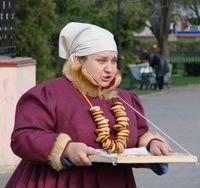Categories: "Adjectives"
Этот
The Russian word этот is a demonstrative adjective that can be translated as this/that/these/those, depending on the context. (For a discussion of the this/that distinction, see the entry on тот.) It declines like this:
| Masc | Neut | Fem | Pl | |
| Nom | этот | это | эта | эти |
| Acc | * | эту | * | |
| Gen | этого | этой | этих | |
| Pre | этом | |||
| Dat | этому | этим | ||
| Ins | этим | этими | ||
For first- and second-year Russian students, I call this word ‘changing это’ because it changes it's ending for case, number and gender. Beginners often confuse it with ‘unchanging это’; for discussion of the distinction, see this blog entry.
| — Что ты читаешь? — Анну Каренину. — Ох, как я люблю эту книгу! |
“What are you reading?” “Anna Karenina.” “Oh, I love that book so much!” |
| — Кто живёт в этом доме? — Откуда мне знать? |
“Who lives in that house?” “How should I know?” |
| Эти упражнения очень трудные. | These exercises are really difficult. |
| Ты давно работаешь с этими людьми? | Have you been working with these people for a long time? |
Тот
The Russian word for ‘that,’ as in “that car,” “that dog” or “that house” is тот. Grammatically it is a demonstrative adjective, thus it occurs in forms that vary for case, number, and gender, and of course it agrees with the noun it modifies. It declines like this:
| Masc | Neut | Fem | Pl | |
| Nom | тот | то | та | те |
| Acc | * | ту | * | |
| Gen | того | той | тех | |
| Pre | том | |||
| Dat | тому | тем | ||
| Ins | тем | теми | ||
Here are some sample sentences:
| — Кто живёт в том доме? — Вампир. Туда не ходи. |
“Who lives in that building?” “A vampire. Don't go there.” |
| В том году мы жили в Уфе. | That year we lived in Ufa. |
| На той планете никогда не было настоящей атмосферы. | There never was a real atmosphere on that planet. or That planet never had a real atmosphere. |
In English the difference between ‘this’ and ‘that’ is essentially distance. Theoretically the same thing is true in Russian, but somehow the distance factor is not quite the same in these languages. Truth to tell, I haven't come up with a proper explanation of the difference, but here are my current hypotheses:
English
- If something is close to me, I use ‘this.’
- If something is close to you, I use ‘that.’
- If something is far from both of us, I use ‘that.’
Russian
- If something is close to me, I use «этот».
- If something is close to you, I use «этот».
- If something is far from both you and me but I can use a gesture (either hands or a glance) to point it out and we can both clearly see it, I use «этот».
- If something is far from both you and me and it is partially blocked by intervening items, I use «тот».
- If something is far from both of us and not visible but we have spoken about it before, I use «тот».
In other words, there are quite a few contexts where even этот is best translated as ‘that’ in English. For instance, let's say your Russian friend sees you reading a book and wants to know the name of the book, the question will most likely come out like this:
| Как называется эта книга? | What's the name of that book? |
If you and a Russian friend are standing on the sidewalk looking at a building across the street. If your friend points to the building and inquires who lives there, then it's most likely to come out like this:
| Кто живёт в этом доме? | Who lives in that building? |
If you and your Russian friend are talking about a building in the distance that is partially blocked by other buildings, you will most likely use «тот»:
| — Кто живёт в том доме? — В каком? — Вон в том с красной крышей, за церковью.» |
“Who lives in that building?” “In which one?” “There in that one, the one with the red roof behind the church.” |
And if you can't see the building but you've discussed it before, «тот» is best:
| Кто живёт в том деревянном доме на Садовой улице? Помнишь, мы о нём говорили, там ещё такая злая собака, лает без умолку. Не знаю как соседи бедные спят | Who lives in that building on Sadovaya Street? You remember, we talked about it. There's a really mean dog there that never stops barking. I don't know the poor neighbors manage to sleep. |
In short, one cannot mechanically say that этот always corresponds to ‘this,’ and тот always corresponds to ‘that.’ You will need practical experience wth Russian life to start getting a feel for the contexts where each is used.
BTW, I'm actively on the lookout for better explanations of the this/that этот/тот distinction. Please feel free to express disagreements, corrections, or other insights in the comments. We are all here to do a better job at cross-cultural communication, so your input will be appreciated.
Колоритный
 Do you ever think about how you learn certain words? You grow up using some of them without even stopping for a second to think of their meanings or how you came to know them. For example for me, apart from the obvious books and movies, my parents have always been a great source.
Do you ever think about how you learn certain words? You grow up using some of them without even stopping for a second to think of their meanings or how you came to know them. For example for me, apart from the obvious books and movies, my parents have always been a great source.
One of the words that I am sure I have learned from my mom is «колоритный». It is an adjective that means “vivid” or “colorful” and mostly appears in literature. It can be used to describe a painting that catches the eye with its bright colors and a special attention to details.
| — Ты видела последнюю картину Репина? — Да, очень колоритная. |
“Did you see Repin’s last painting?” “Yes, very vivid.” |
| Картины Ренуара отличаются характерными колоритными мазками. | "Renoir’s paintings are notable for their distinctive colorful brushstrokes." |
Also, this word is used figuratively to describe a person’s distinctive style and originality or a writer’s lively manner, in which one expresses his or her thoughts on paper.
| Книги Набокова написаны очень колоритным языком. | "Nabokov’s books are written in a very vivid manner." |
| Леди Гага очень колоритная. Её одежда всегда отличается своеобразностью. | Lady Gaga is very unique. Her clothing always distinguishes itself by its originality. |
| — Ты видела на базаре женщину, которая баранками торгует? — Да, колоритная личность... |
“Have you seen that woman who sells pretzels at the market?” “Yes, what a unique individual…” |

The nouns formed from the same root are «колорит» and «колоритность» and the adverb is «колоритно».
| — Николай очень колоритно говорит. — Да, и так убедительно! Я уже и не помню, почему я несогласна была вначале. |
“Nicolas speaks very eloquently.” “Yes, and convincing too! I don’t even remember why I didn’t agree in the beginning.” |
| Красный шарф придаёт этому наряду особую колоритность. | "The red scarf makes this outfit look especially distinctive." |
As teenagers we all go through different stages of trying new styles. More often than not they fail and we inevitably move on to something else. Likewise, I was experimenting with my hair color and outfits. Luckily, I had a mother who, instead of laughing in my face or getting mad, would just call my look «колоритный», no matter how weird it seemed to her. That is not to say she didn’t try to change it later… As they say, “mother knows best”... ![]()
Злой
Злой is an adjective that beginners trip over for several reasons. First off, it is so short that it looks funny and they can't really believe that it's not longer:
| Masc | Neut | Fem | Pl | |
| Nom | злой | злое | злая | злые |
| Acc | * | злую | * | |
| Gen | злого | злой | злых | |
| Pre | злом | |||
| Dat | злому | злым | ||
| Ins | злым | злыми | ||
| Short forms | Comparative | |
| Masc | зол | злее |
| Fem | зла | |
| Neut | зло | |
| Pl | злы |
Very often beginners memorize the word as meaning “wicked.” That's true as far as it goes:
| Сталин был злым диктатором. | Stalin was an evil dictator. |
However the word very often just means “mean” or “angry”:
| Не старайся погладить нашу кошку. Она очень злая и сразу укусит тебя. | Don't try to pet our cat. She's really mean and will bite you without warning. |
| Вчера отбуксировали мою машину из парковки. Какой я был злой! | Yesterday they towed my car from the parking lot. I was so angry! |
Красивый
In English we say a man is handsome and a woman is pretty. Russians roll both concepts up in the single word красивый. It is completely regular in its declension, including its comparative form красивее:
| Masc | Neut | Fem | Pl | |
| Nom | красивый | красивое | красивая | красивые |
| Acc | * | красивую | * | |
| Gen | красивого | красивой | красивых | |
| Pre | красивом | |||
| Dat | красивому | красивым | ||
| Ins | красивым | красивыми | ||
Sample sentences:
| Какая она красивая! | How beautiful she is! |
| Какой он красивый! | How handsome he is! |
| Антонио Бандерас — очень красивый мужик. | Antonio Banderas is a very handsome guy. |
| Кристина Агилера — очень красивая девушка. | Christina Aguilera is a very pretty girl. |
| Кто красивее: Кети Перри или Зоуи Дешанель? (source) | Who is prettier, Katy Perry or Zooey Deschanel? |
| Бабушка всегда хотела жить в красивом доме, но дедушке всегда было жалко денег. | Grandma always wanted to live in a pretty house, but Grandpa always begrudged the money. |
| Она такая красивая, каких мало! | She is beautiful beyond belief! |
| Он донельзя красивый парень! | He is an unbelievably handsome guy! |
(Note that when «донельзя» is used to mean “very,” it is written as a single word and the stressoccurs not on the last syllable, but on the penultimate syllable. You could also say «до невозможности» in that context.)